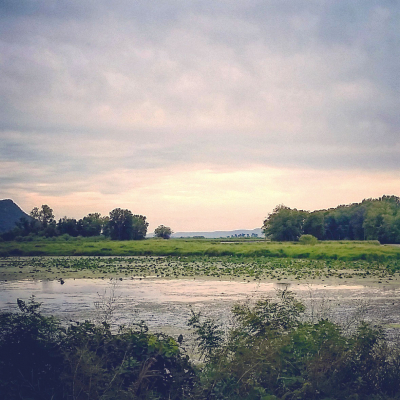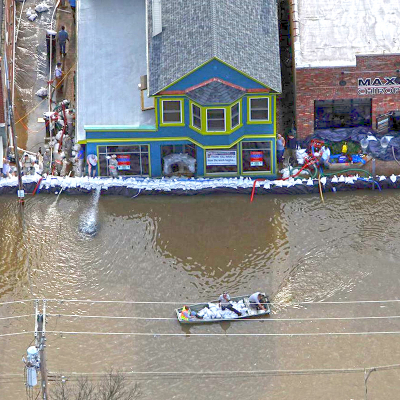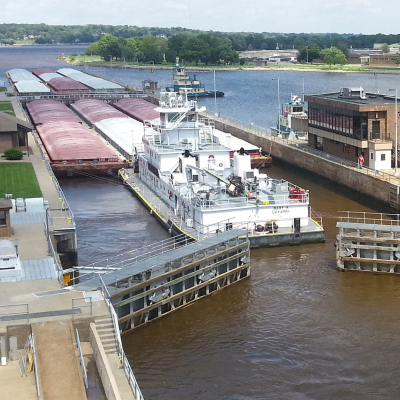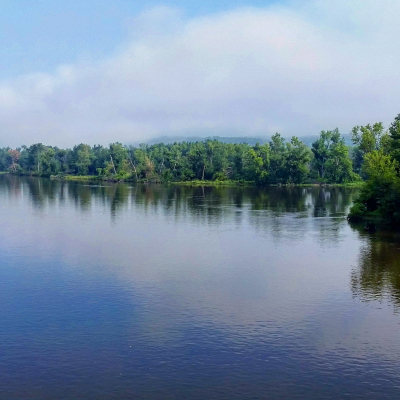The passage of the 2020 Water Resources Development Act (WRDA) reinforced Congress’ commitment to integrated, multipurpose management on the Upper Mississippi River and water resources across the nation. In the same action, Congress supported the region’s goals for improving disaster preparedness, economic growth and resilience, and ecological health on the Upper Mississippi River. This includes:
- Substantially increasing the annual authorized appropriation for the Upper Mississippi River Restoration program
- Alleviating constraints to the Inland Waterways Trust Fund that will fund the Navigation and Ecosystem Sustainability Program (NESP)
- Removing the largest policy impediment to beneficial use of dredged material – i.e., modifying the Federal low-cost standard
- Authorizing the construction of GLRMIS construction for a total cost of $858 million as well as the Grand River Basin ecosystem restoration project in Iowa and Missouri and the Meramec River Basin ecosystem restoration project in Missouri
UMRBA offered the following specific comments to the U.S. Army Corps of Engineers as it develops guidance for implementing the provisions authorized in WRDA 2020:
Inland Waterways Trust Fund: The adjustment of the Inland Waterway Trust Fund cost share allocation to inland waterway lock construction and major rehabilitation projects will help ensure that the Upper Mississippi River and nation’s inland waterways are able to reliably and efficiently serve an integral role in domestic and international transportation. But, federal investment in the nation’s waterways infrastructure must be equitable. There is dismaying discrepancy between the Upper Mississippi River System’s contributions to the Inland Waterways Trust Fund and the return investment in the river’s infrastructure. UMRBA respectfully requests that the Administration place a higher priority on financing the Navigation and Ecosystem Sustainability Program for the Upper Mississippi River System.
Project partnership agreements: Implementing the solutions that involve the states or other nonfederal entities serving as cost-share sponsors is impeded, or are dramatically slowed, by the terms required in the cost-share project partnership agreements (PPAs). UMRBA encourages the Administration to participate actively with Congress, UMRBA, and other nonfederal sponsors to seek a legislative solution to shared liability and respectfully request that the U.S. Army Corps of Engineers provide a clear termination date for the OMRR&R responsibilities. Section 143 of WRDA 2020 directs the Corps to include a brief description and estimation of the anticipated OMRR&R costs for nonfederal sponsors in the project partnership agreements. UMRBA respectfully requests that the provision also include a defined end-term based on the expected useful life of the project’s construction features – i.e., match the 50-year project design life.
In addition, UMRBA respectfully suggests that a provision be added providing greater specificity regarding adaptive management to address risk and uncertainty with respect to achieving project outcomes as well as the need and ability to perform OMRR&R obligations dependent on whether the project features perform as intended.
Beneficial Use of Dredged Material: Congress’ change to the Federal standard calculation provides tremendous opportunity – not only for the Upper Mississippi River but for the coasts, Great Lakes, and rivers across the country. Implementation guidance is particularly important to ensuring that beneficial use can play a significant role in the river’s long term resilience to sedimentation as well as in advancing integrated river management. UMRBA respectfully requests that a representative team of interdisciplinary and interagency experts from the Upper Mississippi River and other regions across the country serve on a team to consider implementation guidance. UMRBA would welcome the opportunity to participate in such a dialogue.
Given the numerous project types and unique ecological and social factors throughout the country, UMRBA encourages the Corps to consider how to balance the need for long term flexibility with the necessary direction that Districts will require. UMRBA understands that the policies related to beneficial use are complex, including methods for calculating environmental and economic benefits and efficiencies. In the letter, UMRBA provides a few observations of beneficial use limitations beyond the low-cost Federal standard.
Floodplain Resilience Planning: UMRBA is pleased by Congress’ support for the Corps’ Section 729 planning authority to advance resilience planning on the Upper Mississippi River System. UMRBA would be the cost-share sponsor of the Section 729 study as directed by Congress in Section 214 of WRDA 2020. UMRBA is interested in using the planning authority to develop integrated, systemic plans to managing floods, drought, and sediment in the Upper Mississippi River System floodplain. We believe that it will be important to consider the changing weather, landscape, hydrology, and geomorphology as well as the region’s economic, social, and ecological values when advancing each of the following specific objectives:
- Develop an integrated, comprehensive, and systems-based plan to minimize the threat to health and safety resulting from flooding by using structural and nonstructural floodplain management measures
- Develop new, or renew existing, comprehensive long-term channel management plans that are sustainable, cost-effective, and ecologically sensitive
- Develop mitigation strategies for multi-year drought events that would increase the resilience of communities and economies adjacent to, or dependent on, the Upper Mississippi and Illinois Rivers nt in the Upper Mississippi River System floodplain.




